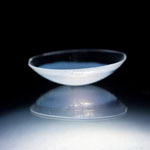
Like a miniature donut stuffed inside a tiny pita pocket, a common glaucoma medicine held within a biomaterial ring is sandwiched inside this contact lens. In laboratory experiments, the lens, which can also correct vision, releases the eyesight-saving medication at a steady rate for up to a month. Its construction offers numerous potential clinical advantages over the standard glaucoma treatment and may have additional applications, such as delivering anti-inflammatory drugs or antibiotics to the eye. Led by Daniel Kohane and Joseph Ciolino at Harvard Medical School, the researchers who developed the lens are now gearing up to test its effectiveness in additional laboratory studies. They hope a Phase I clinical trial to evaluate the safety and ability of the lens to reduce pressure in the human eye could begin in about a year.
This work also was funded by NIH’s National Eye Institute.
Learn more:
NEI Glaucoma Awareness Month Resources


I’d like to know if one already wears contact lenses (and has for almost 50 years), do we have any different risk of developing glaucoma than those who wear or never previously wore glasses?
Our colleagues at NIH’s National Eye Institute shared this reply from one of its grantees who’s an expert on environmental factors and glaucoma:
“There is no association between wearing contact lenses and having or developing glaucoma.”
Nice and a very useful blog. Keep sharing.